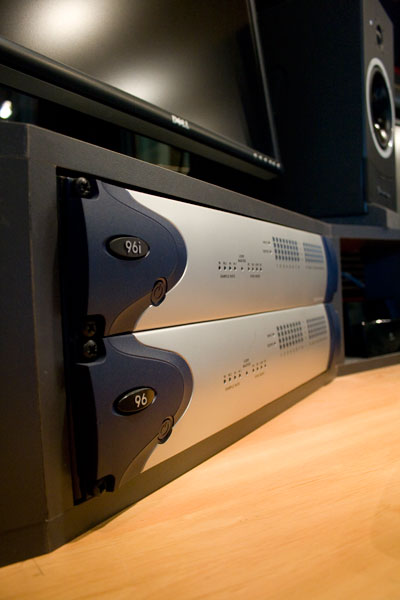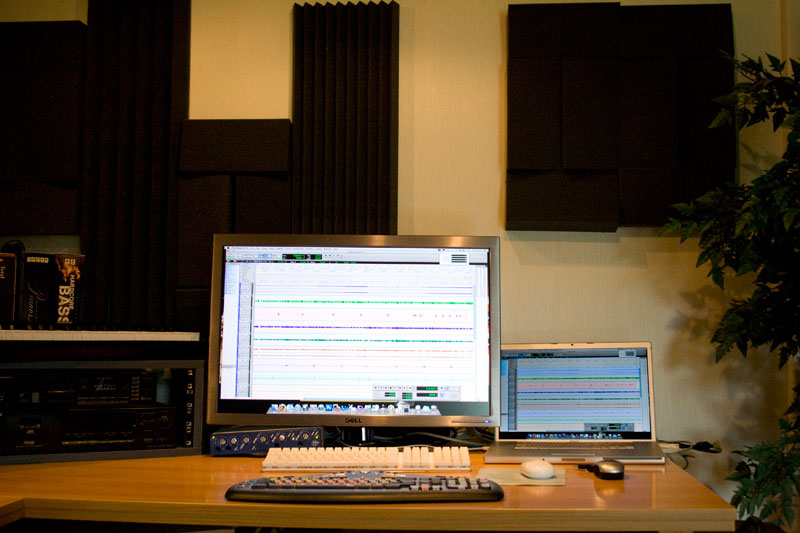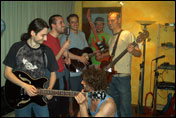How we work :

We start with the soundcheck and tuning of the drums, this may take some time. Afterwards we record the drumparts guided by a guitar- and/or bass-pilot (or even a vocal-pilot). Preferable we record with click track (metronome) but not every drummer can pull this off. Try rehearsing your songs to click track to get used to the feeling. We can save some studio time when you figure out the songs' structure and tempo at home.
When the drumparts are finished, we usually start with the bassparts but we can record the guitarparts first if you prefer. We follow the same procedure for each instrument: soundchecking the instrument, choosing and placing the microphones, testing and eventually recording.
After every recording it's important to listen carefully for any mistakes. The final instruments to record are the vocals. As before, choice and placement of the microphone are very important.
After approving all the recordings, we can start the mixdown.
In our opinion it's best to start mixing with "fresh" ears, e.g. the next day, but it all depends on the available studio time. Mixing is a time consuming process. It's a good idea to add a mixing-day for every recording-day.
During mixdown the tracks get stripped down and, if necessary, treated with eq, dynamics processor, reverb, delay, effects, vocal correction, etc. Finally with the use of volume and panning the tracks are mixed together into a stereo pair or surround depending on the request.
The last step is to master the stereo tracks.
Mastering is dificult to explain but it will give your mixed songs more power, volume, brilliance, wider stereo image, etc. It's an extremely important step in the whole process. It's the icing on the cake! You can take the mixed songs to a dedicated mastering studio and a new set of trained ears (If your budget allows you) or you can let me do the job. It's up to you.
How much time will it take ?

A lot depends on the quality and the amount of songs (read minutes) you want to record. Are you recording a demo, Project or full length album? If you prefer really good quality, my advise is to record every instrument seperatily.
But if you need to speed things up, we can record some instruments together. We can put a guitar amp in the iso-booth, record the bass directly (with Ampeg simulation) and put the drumset in the live room. Vocals and extra instruments get recorded afterwards. To speed things up even more we can record all the instruments together but then we don't end up with perfectly isolated tracks.
There's no harm in a little studio stress but constantly working against the clock leads rarely to a good result. One week for a full length record ain't by far excessive. A good starting point is to count 3 days for a (very good sounding) demo and 6 or 7 days for a full length. (1 day = 8 to 9h) BUT everything is debatable! Feel free to get in touch and we'll try to work something out. Also take a loook at our special prices for bundles, they may just what you where looking for to maintain your budget.
Rehearse ! REHEARSE !
Make sure that you control your songs perfectly. My goal is to guide you through the recording process as smooth as possible, nevertheless there's always an amount of stress involved when you've got to perform a perfect take. Therefore it's very important to be able to perform your parts in "automatic pilot". You loose (expensive) studio time fast when you're not able to play your parts easily. A good idea is to do a rehearsal with only 2 musicians (e.g. drums & bass).
Ref. : (c) Bart from http://www.highlakehill.be . His description on how he works, fits perfect our way of working too. Thanks Bart !



